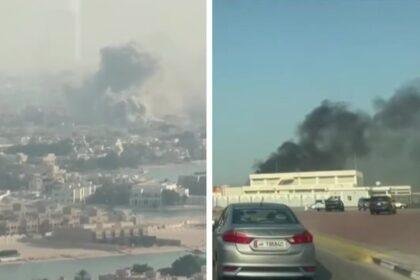Ukrainian President Zelensky Calls for Stricter Sanctions as Russian Weapons Found to Contain Foreign Components
In a significant escalation of rhetoric, Ukrainian President Volodymyr Zelensky has accused Russia of utilizing weapons that contain components sourced from allied nations, including the United Kingdom, Germany, and the United States. This revelation comes in the wake of a series of deadly strikes on Ukraine, which have intensified calls for more effective sanctions against Russia.
The Discovery of Foreign Components
During a recent address, Zelensky highlighted that Russian missiles and drones used in attacks on Ukraine were found to contain British microcomputers, along with over 100,000 foreign-made parts. This alarming discovery raises questions about the effectiveness of existing sanctions and the ongoing supply chains that may inadvertently support Russia’s military efforts.
A spokesperson for the UK’s Department for Business and Trade (DBT) acknowledged the seriousness of these findings, stating that the government is actively working to prevent UK businesses from supplying products that could end up in Russian weaponry. “We take reports of goods from UK companies being found in Russian weaponry incredibly seriously,” the spokesperson remarked.
The Broader Context of Sanctions
The UK government has implemented a comprehensive sanctions regime against Russia, banning the export of thousands of goods, including critical battlefield items. This initiative is part of what officials describe as “the most severe package of sanctions” ever imposed. However, the effectiveness of these measures is now under scrutiny, especially as Zelensky pointed out that microcomputers used for drone flight control are produced in the UK.
Zelensky emphasized the need to “shut down every scheme that circumvents sanctions,” asserting that Ukraine’s allies possess detailed information on companies and products still being utilized by Russia. This call to action reflects a growing frustration among Ukrainian officials regarding the loopholes that allow Russian military operations to continue.
The Role of Other Nations
In addition to the UK, Zelensky identified other countries, including China, Taiwan, and the Netherlands, as contributors to the supply chain of components found in Russian weapons. This highlights a complex web of international trade that complicates the enforcement of sanctions and raises ethical questions about global commerce in times of conflict.
Recent Attacks and Human Cost
The urgency of Zelensky’s appeal is underscored by the recent violence in Ukraine. Over the weekend, Russia launched a staggering 549 missiles and drones, resulting in tragic casualties, including the deaths of four family members in the village of Lapaivka, among them a 15-year-old girl. Such incidents serve as grim reminders of the human cost of the ongoing conflict and the stakes involved in the international response.
Russia’s Economic Resilience
Despite the extensive sanctions imposed since the onset of the conflict in 2022, Russia’s economy has shown a surprising degree of resilience. Analysts note that the country has adapted to the sanctions, with increased military spending compensating for job losses in other sectors. Furthermore, Russian energy exports have found new markets in countries like China and India, which have stepped in to fill the void left by European nations cutting trade ties with the Kremlin.
This economic adaptability raises questions about the long-term effectiveness of sanctions as a tool for influencing state behavior. While the immediate impact of sanctions can be significant, the ability of a nation to pivot and find alternative markets complicates the narrative of economic isolation.
The Path Forward
As the conflict continues, the international community faces a critical juncture. Zelensky’s call for more effective sanctions is not merely a plea for immediate action; it reflects a broader strategy to ensure that the international response to Russian aggression is both robust and sustainable. The challenge lies in balancing the enforcement of sanctions with the realities of global trade and the interconnectedness of modern economies.
In conclusion, the situation in Ukraine remains dire, with the ongoing conflict highlighting the complexities of international relations and the challenges of enforcing sanctions. As President Zelensky calls for a renewed commitment to effective sanctions, the world watches closely, aware that the stakes are not just geopolitical but profoundly human. The need for a coordinated and comprehensive response has never been more urgent, as the consequences of inaction could reverberate far beyond the borders of Ukraine.











